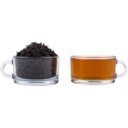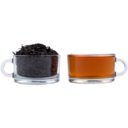Ceylon Oolong
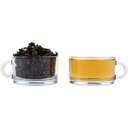 |
|
Commercial Description
This low grown blend offers a fragrant, gentle experience. Harvested from a single estate in the Galle District in Sri Lanka, our green Oolong tea is certified ‘ozone-friendly’...It is fresh and mild in flavor, and orange in appearance. It is distinctive for its aroma, leaf, and liquor.
Ratings & Reviews
Page 1 of 1 page with 2 reviews
 92 Aroma: 9/10 Flavor: 5/5 Value: 4/5
92 Aroma: 9/10 Flavor: 5/5 Value: 4/5Brytta Sóþword (336 reviews) on Mar. 15th, 2017
I really enjoy this tea. It's one of my favorites from teakruthi so far. The flavor is pleasant in a soothing yet slightly buttery way. Eating food seems to bring out additional flavors not in either the food or tea alone, so this one is great on its own or with meals. I didn't add any sugar or milk to it. The curled leaves expand a lot, but I still enjoy using a decent amount of leaf to get a nice, full flavor.
Lovely tea.
 81 Aroma: 8/10 Flavor: 4/5 Value: 3/5
81 Aroma: 8/10 Flavor: 4/5 Value: 3/5Alex Zorach (1453 reviews) on Jan. 25th, 2017
I've reviewed over a hundred oolongs, and tried several oolongs from "unusual" places, i.e. countries that are not known for making oolong, including India, Kenya, Japan, and Nepal, but this is the first one I've tried from Sri Lanka.
It was very strange, and I'm glad I tried it, but it's the sort of tea I would have to be in the mood for. My first impression when drinking it was "Whoa!" It superficially seems like other green oolongs, but I found it singular. It had a lot of enjoyable qualities, but also had a harshness and a number of fairly strong and distinctive qualities that I think might make it a bit harder for some people to appreciate. Normally I think of oolongs as rather smooth, mellow, and inoffensive, and this tea wasn't quite like that. Teakruthi describes this as "gentle" and I'm not sure I'd agree. It was one of the boldest, most potent oolongs I've tried.
The dry leaf looks a lot like an Anxi or Taiwanese oolong. It has a pleasant floral smell, although there's also a strange, heavy smell in there too, one that I find a little unpleasant, almost a little like burned syrup. The leaf is a bit heterogeneous in shape, some of the leaves seem more tightly rolled than others.
The brewed cup smells very vegetal and herbaceous, but also of flowers and honey. There are more deep vegetal notes, reminding me of oolongs produced in Darjeeling.
The first sip is enigmatic...the flavor is super intense, with a little bitterness and sweetness lingering together through the sip. There's a very strong honey flavor. Very full-bodied, stronger than any other oolong that has been as light or smooth as this.
I find this tea kept more-or-less the same character not only through drinking the cup, but through multiple infusions. Like a lot of whole-leaf oolongs, the flavor is slow to infuse out of the leaf, and it resteeps quite well. I found it easy to make three cups. The leaves unfurl slowly and aren't fully unfurled after a first steep of even 3 minutes.
This tea was a little picky about brewing though, in that I found it could taste a bit thin if brewed too weakly, and the flavor could be a bit harsh (and the vegetal tones overbearing) if it was brewed too strongly. Brewing temperature doesn't seem to make much of a difference...the first steep came out a bit thinner if I used lower-temperature water, but subsequent steeps weren't affected much at all.
I wouldn't recommend this for everyone. This is an oolong if you like strong flavors and dominant vegetal and herbaceous notes. It's very complex and I can see it pleasing connoisseurs, the sorts of people who prefer oolongs like Mao Xie or Fo Shou.
The one thing that impressed me most though about this tea, they seem to have pinned down some key aspect of the essence of green oolongs that has been missing from all the Indian oolongs I've tried. If you handed me this and I didn't know where it was from, I could be convinced this had been grown in China or Taiwan.
Page 1 of 1 page with 2 reviews
More Pure Tea (Camellia sinensis) from Matara, Sri Lanka from teakruthi
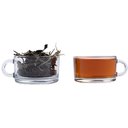
Blissful Harmony
| Style: | Black and White Blend |
| Region: | Matara, Sri Lanka |
| Caffeine: | Caffeinated |
| Leaf: | Loose |
13
3 Ratings
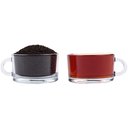
Rainforest Indulgence
| Style: | Ceylon Black Tea |
| Region: | Matara, Sri Lanka |
| Caffeine: | Caffeinated |
| Leaf: | Loose |
2 Ratings


